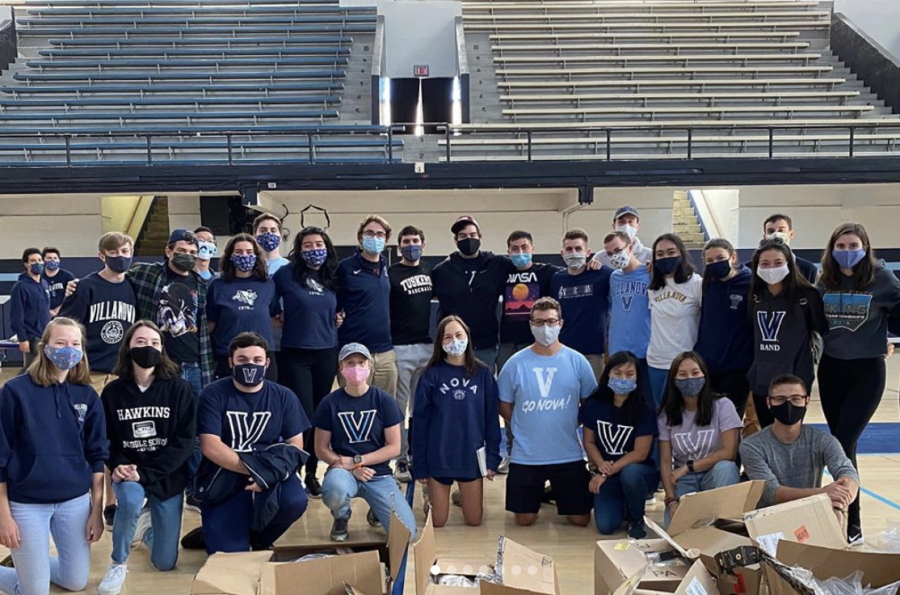Weekly Club Spotlight: Band and Chamber Strings
Members of Villanova Band volunteer at the 2020 Villanova Day of Service.
November 4, 2020
The Villanova Band and Chamber Strings ensemble can always be counted on as a musical force to liven up events on campus. Under the Office of Music Activities, these two organizations encourage and allow musicians to express their art forms.
Because the University does not offer a music major, the Villanova Band and Chamber Strings provide an opportunity to students from colleges across the University to share their talents through performance and involvement with the community.
The Villanova Band prides itself on being the oldest and largest student musical organization on campus. Performing at a variety of functions throughout the year, the Band has three subcategories depending on the event and music required.
The Concert Band emphasizes the musical nature of the band, playing a wide variety of music from all time periods. In addition to performing three times a year, the band typically travels during fall break to various places across the country to promote the University.
The Pep Band is most visible on campus during the basketball season. Playing a variety of music from pop to Dixieland, these members are known as the most avid basketball fans on campus. Attending all home basketball games and some away games, members attend the Big East Tournament yearly and free of charge.
The Scramble Band performs during football games. During half-time, students put on a field show, and the website promises that they are “anything but a traditional.”
“I’ve loved my experience in the Villanova band and the friends I’ve made through it,” sophomore mellophone player Emily Holland said. “I joined because I wanted to continue my passion for playing music in college and meet people who share this love for music. I also love supporting the basketball team through pep music at all the home games.”
Holland has been playing the mellophone since freshman year of high school.
The current Villanova Band president is Billy Mallory, who has been with the band for the last four years and played music since he was seven years old. His current responsibilities include organizing summer Zoom calls for incoming freshmen to get to know the community and increasing the Band’s involvement through campus fundraisers and service, such as 1842 Day and Relay for Life.
“This year has been quite challenging due to the cancelation of a lot of our normal activities like Band Camp and our Fall Tour service trip,” Mallory said. “Currently, we are holding smaller outdoor rehearsals in preparation for performances on campus, at service sites and athletic events.”
The Band welcomes all students regardless of musical background and encourages participation.
On the other side of the music, the University’s Chamber Strings work in coordination with the Villanova Orchestra. Chamber Strings consists of a small group of players, ranging between eight and 15 members.
The word “chamber” indicates that the ensemble is small in numbers but equally as powerful.
“The players have to have a very heightened awareness of each other,” Anna Pulaski, director of Chamber Strings, said. “Above all, it highlights high level playing because it is small and the need for critical and artistic precision is higher.”
The instruments represented in Chamber Strings include the violin, viola, cello and double bass. Differing from the Villanova Band, an audition is required to join the organization. Students are requested to be proficient in their instrument and be able to play scales and a piece for placement.
“I joined chamber strings because I was interested in continuing my music career into college,” freshman violist Gilbert Cai said. “It also seemed like a great way to meet other musicians at Villanova.”
Cai has been playing his instrument for nine years.
Despite COVID-19, Chamber Strings continues to hold practices and create music.
“Since this is my first year, I do not know what has happened in the past, however, we rehearse twice a week in socially distant spaces with masks,” Pulaski said. “While it has been different, the music remains the same, and people are more excited to come to have an artistic release.”












